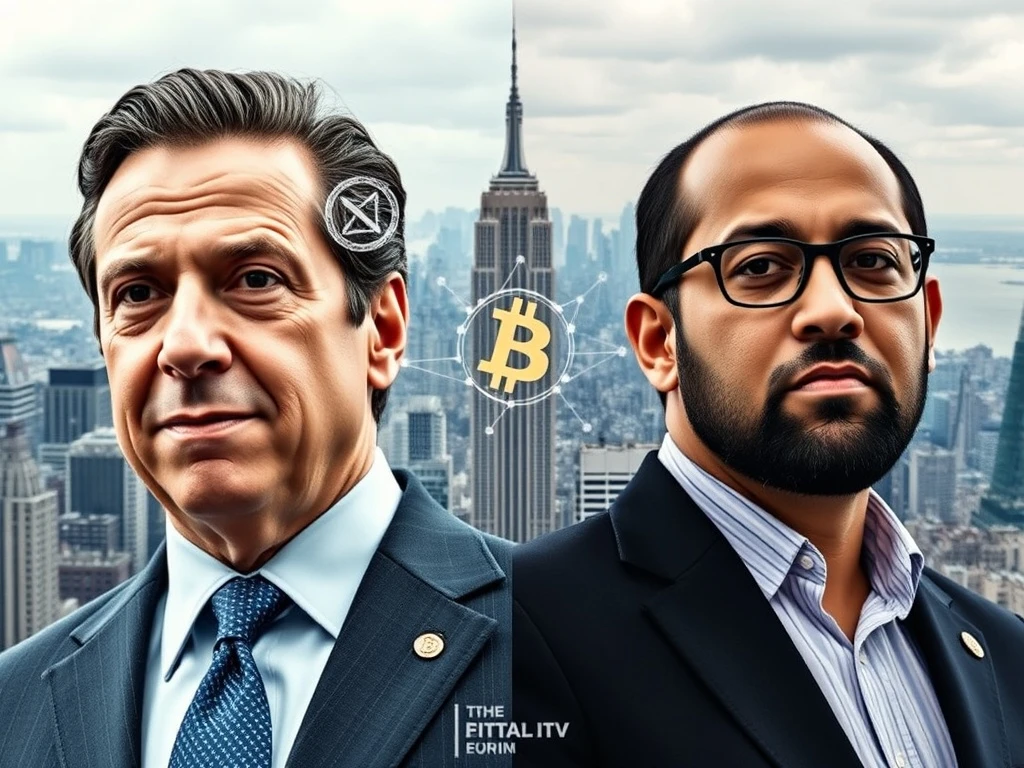NYC Crypto Hub: Andrew Cuomo’s Bold Strategy Faces Uphill Battle in New York Mayoral Race

The intense final weeks of the **New York mayoral race** bring a crucial question to the forefront: can a last-minute push for digital assets reshape the political landscape? Andrew Cuomo, trailing significantly in the polls, has launched an ambitious crypto and AI strategy for New York City. This unexpected move aims to position the metropolis as a global leader in emerging technologies. However, experts question whether this ‘Hail Mary’ effort will genuinely sway voters or merely highlight the growing influence of crypto in political campaigns.
Andrew Cuomo Crypto: A Vision for the Future
Former New York Governor Andrew Cuomo recently unveiled his comprehensive proposal. He seeks to transform New York City into a premier **NYC crypto hub**. His plan, announced on a recent Sunday, includes creating a new office dedicated to attracting cutting-edge tech companies. This includes firms specializing in cryptocurrencies and blockchain technology. Cuomo also proposes an “Innovation Council,” comprising top executives from three key industries: blockchain, biotech, and artificial intelligence. He declared, “The next mayor must ensure we lead in the technologies defining the next century. AI, blockchain, and biotech are vital. This position aims to keep New York City dominant in the global innovation economy.” This bold declaration signals a clear intent to embrace digital innovation.
Cuomo’s strategy reflects a growing trend among politicians. They recognize the potential economic benefits and political capital associated with the burgeoning digital asset sector. Furthermore, his plan mirrors initiatives from outgoing Mayor Eric Adams. Adams also aimed to establish New York as a crypto leader, though with mixed results. While many crypto startups have emerged in the city, existing crypto businesses have not reported significant changes. Observers often note that a mayor’s office typically holds limited sway over the broader development of the crypto industry. Still, Cuomo’s push underscores the increasing relevance of digital assets in urban economic planning.
The Political Stakes: Mamdani’s Lead and Voter Priorities
Despite his proactive stance on digital innovation, Andrew Cuomo faces a substantial challenge. He lags considerably behind Democratic frontrunner Zohran Mamdani. A recent AARP poll revealed Mamdani enjoys a double-digit lead, securing 43.2% support. Cuomo trails with 28.9%. Guardian Angels founder Curtis Sliwa follows at 19.4%, with 8.4% undecided or preferring another candidate. This significant gap makes Cuomo’s crypto initiative appear as a desperate, last-ditch effort.
Crucially, the poll also highlighted voter priorities. Crypto did not rank among the top concerns for respondents. Instead, the **New York mayoral race** centers on more traditional issues. The cost of living remains the primary issue for nearly two-thirds of voters. Public safety and housing affordability also rank as key concerns. The AARP report stated, “Cost of living remains the top issue for nearly two-thirds of voters, with public safety and housing affordability also key.” While optimism about future improvement under new leadership has grown modestly, this does not directly benefit a crypto-focused campaign.
Therefore, appealing to the crypto industry, while financially attractive, may not resonate with the average New York voter. Their daily struggles with expenses and safety overshadow the allure of technological innovation. This disconnect poses a significant hurdle for Cuomo’s campaign. He must bridge the gap between his future-focused vision and the immediate concerns of the electorate.
Crypto Election Influence: Lobbying Power and Endorsements
The appeal of turning to the crypto lobby is undeniable. Crypto lobby groups shattered campaign funding records in the 2024 elections. They made digital asset regulation a top priority for lawmakers nationwide. This surge in political donations reflects the industry’s desire for favorable regulatory environments. The Winklevoss twins, prominent figures in the crypto space, have reportedly donated over $30 million to crypto industry lobby groups this year alone. They have also been vocally critical of Cuomo’s main opponent, Zohran Mamdani.
Tyler Winklevoss, in a June X post, expressed his willingness to “get involved in the NYC mayor race by supporting a candidate that can defeat Zohran Mamdani.” He condemned Mamdani and Democrats generally, labeling Democratic cities as “broken kleptocracies.” He suggested that “anarchy and socialism are the next logical steps.” Winklevoss criticized financiers and hedge fund managers for failing to “protect the system that allowed them to achieve their success.” These financiers, including pro-crypto Pershing Square CEO Bill Ackman, have reportedly contributed millions to Cuomo’s campaign in recent weeks. Such endorsements highlight the significant **crypto election influence** in modern politics.
However, this influx of pro-crypto funding may not translate into widespread voter support for Cuomo. As noted, general voter concerns lie elsewhere. While the crypto industry wields considerable financial power, its ability to shift public opinion on a broader scale remains uncertain. The concentrated wealth of crypto advocates does not always align with the diverse needs of an urban population.
Navigating New York Crypto Policy: Mayoral Limitations
Even if Andrew Cuomo were to achieve a miraculous victory, the actual power of the mayor’s office to influence crypto policy is inherently limited. Outgoing Mayor Eric Adams previously attempted to establish New York as a thriving **NYC crypto hub**. He famously took his paychecks in Bitcoin (BTC) and opposed crypto mining moratoriums at the state level. In February 2023, the city council’s committee on technology met to discuss blockchain, cryptocurrency, and other innovative digital tools. These efforts demonstrated a clear intent to support the industry.
Despite these initiatives, many felt Adams did not fully deliver on his promise by 2024. Thomas Pacchia, founder of the NYC-based Bitcoin bar PubKey, noted that he observed little change in public sentiment. This indicates that mayoral actions, while symbolic, may not always translate into tangible shifts for the broader public or industry. The mayor’s office does hold considerable influence over specific business-critical issues. These include municipal taxes, licensing, and building permits. However, major financial policies and comprehensive regulatory frameworks for the finance industry are largely determined at the state and federal levels.
Consequently, any mayor, whether Cuomo or Mamdani, seeking to significantly influence the crypto industry will likely need to engage with state regulators first. This structural limitation means that even the most crypto-friendly mayor faces an uphill battle in enacting sweeping changes. The complexities of **New York crypto policy** extend far beyond city hall, requiring coordination across multiple governmental layers.
Mayor Adams’ Legacy: Mixed Results for NYC’s Digital Future
Mayor Eric Adams consistently pursued his vision for New York’s digital future. He continued to court the crypto industry, announcing a crypto summit earlier this year to meet with top executives. In May, the New York Office of Technology and Innovation (OTI) reported significant growth. They stated, “crypto and blockchain are our fastest growing tech industries in terms of startups.” This positive trend suggests a vibrant underlying ecosystem.
Just last week, Adams announced the establishment of the New York City Office of Digital Assets and Blockchain. Its goals include “fostering innovation and development while guiding the responsible development of cryptocurrency and blockchain ecosystems in New York City.” The OTI further highlighted impressive statistics: “Since 2019, crypto startups have increased by 177%, and blockchain startups have increased 143%. NYC has 172 crypto startups compared to 151 in San Francisco. NYC also has 262 blockchain startups compared to 251 in San Francisco.” These figures paint a picture of rapid expansion.
However, the extent to which these city-level initiatives directly caused this growth remains unclear. The mayor’s office undoubtedly provides a supportive environment. Yet, broader market trends, venture capital availability, and the city’s inherent appeal as a global financial hub likely play significant roles. The growth might be happening regardless of specific mayoral interventions. This raises questions about the true impact of mayoral policies on the trajectory of **New York crypto policy** and its development.
The Road Ahead for New York’s Digital Future
The ongoing **New York mayoral race** presents a fascinating case study in the intersection of traditional politics and emerging technology. Andrew Cuomo’s bold embrace of a comprehensive **Andrew Cuomo crypto** and AI strategy seeks to redefine New York’s economic future. He envisions a dynamic **NYC crypto hub** that attracts top talent and innovation. However, his significant polling deficit and the electorate’s focus on immediate economic and safety concerns suggest this strategy may not be enough to secure victory.
The substantial **crypto election influence**, evidenced by record campaign donations and prominent endorsements, highlights the industry’s growing political power. Yet, this influence does not automatically translate into widespread voter support. Furthermore, the inherent limitations of mayoral authority over broad **New York crypto policy** mean that even a crypto-friendly mayor faces systemic challenges. The city’s digital asset sector is undoubtedly growing, with impressive startup figures. This growth may reflect organic market forces as much as, or more than, direct city-level initiatives.
Ultimately, the election outcome will determine the immediate future of New York’s engagement with digital assets. Regardless of who wins, the conversation around crypto and blockchain will continue to evolve. New York City remains a critical player in the global financial landscape. Its approach to emerging technologies will shape its economic trajectory for years to come. The debate over how best to foster innovation while addressing pressing urban issues will persist, ensuring crypto remains a topic of interest, if not a deciding factor, in New York’s political discourse.









